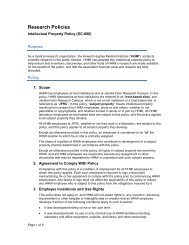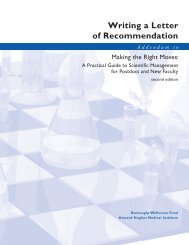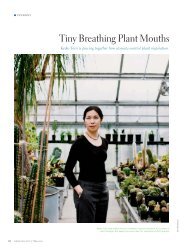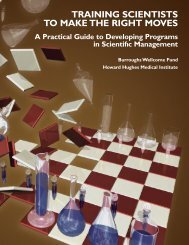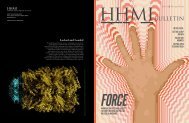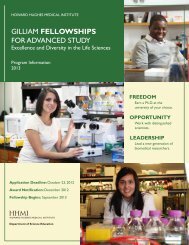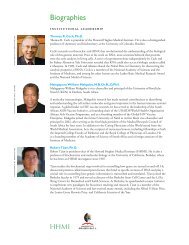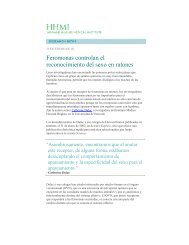Download PDF - Howard Hughes Medical Institute
Download PDF - Howard Hughes Medical Institute
Download PDF - Howard Hughes Medical Institute
Create successful ePaper yourself
Turn your PDF publications into a flip-book with our unique Google optimized e-Paper software.
Q & A<br />
What part of your job would people<br />
find the most surprising?<br />
They do everything from making fly food to fixing centrifuges.<br />
Here, a few lab managers and research specialists<br />
describe some of the more unusual aspects of their jobs.<br />
—Edited by Halleh B. Balch<br />
Heike Pelka<br />
R esearch SpeCIaLIst III<br />
Matthew Adams<br />
Research TechnICIan II<br />
Sarah Sarsfield<br />
Lab Manager<br />
Frank Wilson<br />
Lab Manager II<br />
Danny R einberg lab<br />
New Yor k Universit y<br />
“I think what people will<br />
find most surprising is that,<br />
as a lab manager who has<br />
worked at the bench for<br />
33 years, I do a lot of architectural<br />
work. I even have<br />
my own architectural ruler<br />
now. The biochemistry<br />
wing at NYU was recently<br />
renovated, and I designed<br />
a section of the labs. Of<br />
course, people sometimes<br />
say, “That’s not in your<br />
job description.” Well,<br />
I don’t believe in job<br />
descriptions. You do what<br />
you are capable of.”<br />
Chr istopher Plowe lab<br />
Universit y of MarYLand<br />
sChool of MeDICIne<br />
“The part of my job that I<br />
find most surprising is our<br />
challenge study. We give<br />
patients malaria to study the<br />
disease process and its<br />
symptoms, and then we<br />
cure them. It’s humbling<br />
and interesting to me that<br />
people come to us to get<br />
malaria. They’re sacrificing<br />
a little bit of their health so<br />
that we can learn something<br />
new to create a vaccine or<br />
to learn about the parasite.<br />
Our duty to them is to<br />
make sure they aren’t sick<br />
for too long.”<br />
DavID Gint y lab<br />
Johns Hopkins University<br />
“Some of the procedures<br />
with mice—like checking<br />
plugs—would probably be<br />
among the weirdest stuff<br />
I’ve done. We do developmental<br />
neuroscience,<br />
which means that we study<br />
embryonic development. So<br />
we need to determine when<br />
mice have mated and then<br />
track the pregnant mice.<br />
The morning after you put a<br />
male and a female together,<br />
you check for a plug. If the<br />
mice mated, the female<br />
will have a sperm plug. As a<br />
scientist, I don’t really think<br />
much of it, but when people<br />
ask what I do, I don’t usually<br />
answer, ‘Oh, I spent yesterday<br />
morning checking<br />
80 female mice to see if they<br />
had sex the night before.’”<br />
Pietro De CaMILLI lab<br />
Yale University<br />
“I’m responsible for maintaining<br />
the lab’s infrastructure<br />
along with other operationsrelated<br />
duties. People are<br />
surprised to learn that,<br />
rather than call in a specialist,<br />
I often repair the lab’s<br />
instrumentation myself. My<br />
father was adept at repairing<br />
and constructing electronic<br />
devices, and in my early<br />
years I picked up a lot by<br />
watching him at work in the<br />
basement. I’m not afraid<br />
to open up an instrument,<br />
even if I don’t normally<br />
operate it, and I can usually<br />
diagnose the point of failure<br />
if a system is faulty. I find it<br />
a welcome change from<br />
tedious administrative tasks.”<br />
Heike Pelka, Matthew Adams, Sarah Sarsfield, Frank Wilson<br />
36 h h m i b u l l e t i n | Fall 2o12




